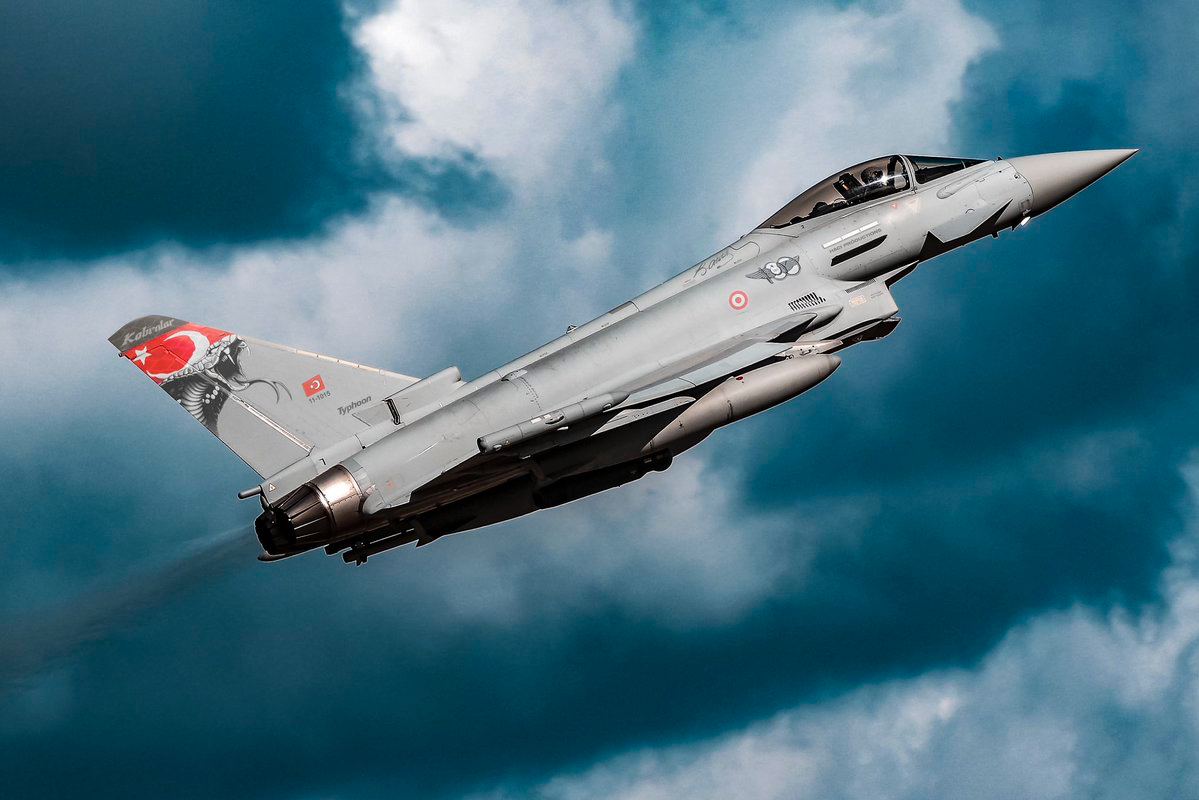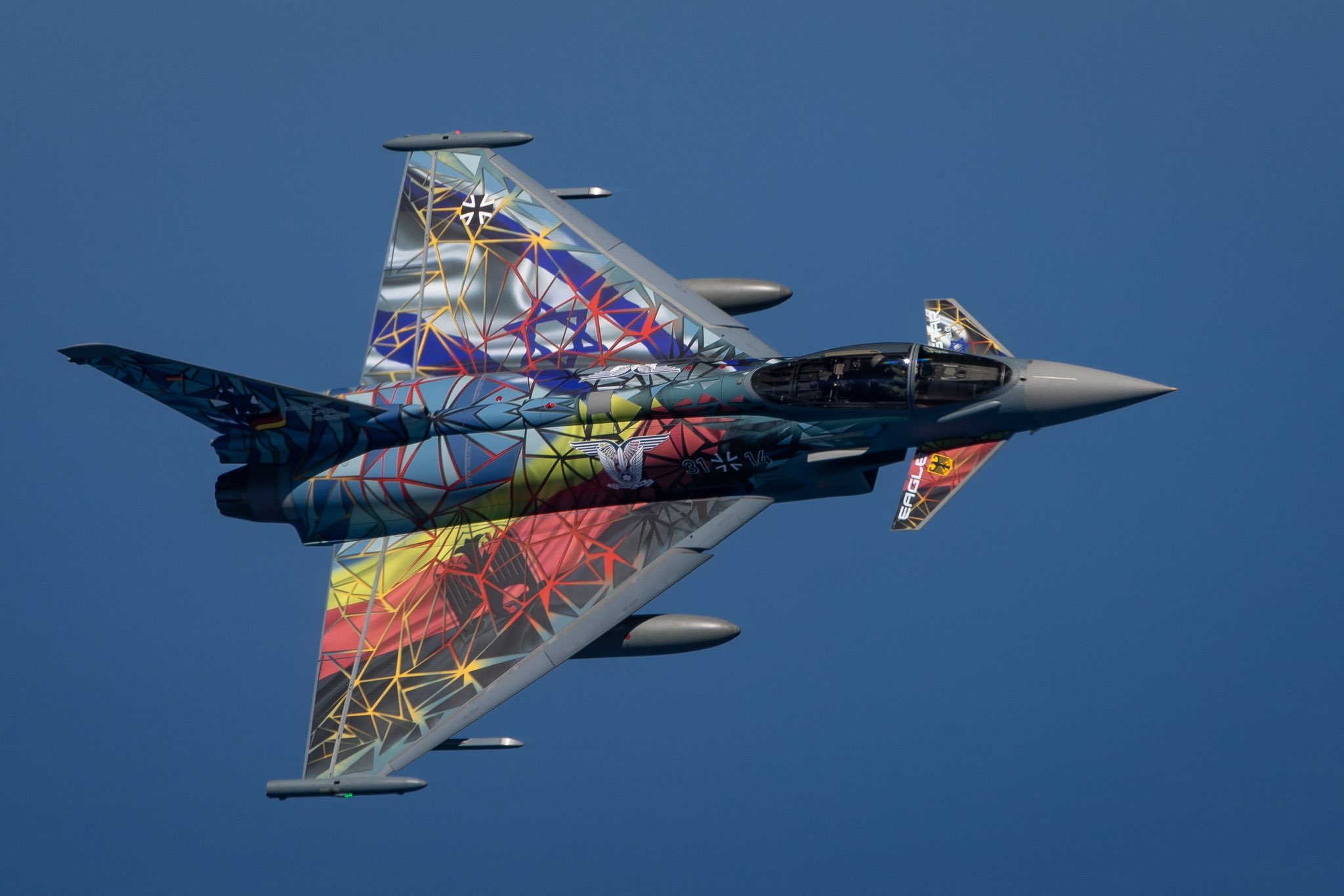Turkey’s announcement of its plans to purchase 40 Eurofighter Typhoon jets may face obstacles due to the program’s collaborative nature. Germany, in particular, is anticipated to oppose the sale to Turkey.
US Integrates The Iconic PAC-3 Patriot Missile System With LTAMDS Radar To ‘Deflate’ Air-Breathing Threats
The timing of this development aligns with German industry representatives cautioning their government that the failure to secure new contracts could potentially lead to the cessation of Eurofighter production by 2030.
On November 16, Turkey’s defense minister, Yasar Gular, officially declared ongoing negotiations with Spain and the United Kingdom to acquire Typhoon jets potentially.
Although Germany has reportedly expressed opposition, the position of Italy, the fourth pivotal member in the Eurofighter consortium, remains unclear.
“We want to buy Eurofighter. It is a very effective aircraft. These aircraft are related to the UK, Germany, and Spain,” he told parliament. “Both the UK and Spain say ‘yes,’ and now they are working to persuade Germany. The UK and Spain say: ‘We will solve that problem’. If solved, we plan to purchase 40 Eurofighter jets.”
Yasar Guler noted that the existing fleet of F-16 and F-4 jets in the Turkish Air Force is sufficient for the nation’s current operational requirements. However, he acknowledged that Turkey had pursued the acquisition of F-35 jets but encountered complications in the process.
This setback arose in 2019 when the US suspended Turkey from the F-35 fighter jet program, citing concerns over Turkey’s purchase of the Russian S-400 missile defense system, which was deemed a threat to the F-35s.

In response, Turkey consistently asserted that there was no conflict between the two systems and proposed the establishment of a commission to address the issue. Despite Turkey’s claims of fulfilling its obligations for the F-35 program, it faced suspension, leading to a search for alternative solutions.
As part of this strategy, Turkey turned to the United States to purchase 40 F-16 Block 70 Vipers. Additionally, plans are in place to modernize 79 existing F-16s.
In 2021, Turkey formally requested 40 F-16 jets and modernization kits from the US, with the State Department informally alerting Congress of the potential sale.
Still, the deal hangs in uncertainty, contingent upon Turkey’s ratification of Sweden’s NATO membership, a condition set by Washington before considering the sale of F-16s or any other fighter aircraft to Turkey.
Guler underscored that the acquisition and modernization of these fighter jets are intended to bolster Turkey’s defense capabilities and are also viewed as a contribution to the strength of NATO.
Nonetheless, if the deal to acquire the Eurofighter Typhoon progresses, there are indications that the procurement of those 40 aircraft could be structured into two batches of 20 each.
Germany Objects To Eurofighter Sale To Turkey
Turkey’s eagerness to secure a deal is driven by the need to respond to Greece’s acquisition of Rafale fighter planes, as the two neighboring NATO allies engage in sporadic aerial conflicts over territorial disputes in regions such as the Aegean Sea and the Eastern Mediterranean.
However, German Chancellor Olaf Scholz is expected to rebuff Turkish President Recep Tayyip Erdogan’s renewed request to purchase Eurofighter Typhoon jets during their meeting in Berlin on November 17.
Tensions persist between the two nations, stemming from issues such as Turkey’s condemnation of Israel.
Erdogan is likely to seek the removal of the block on the fighter plane sale, which is crucial for updating Turkey’s aging airforce. Still, German officials anticipate that Chancellor Scholz will not grant consent.
Diplomatic strains, particularly within the NATO alliance, contribute to Germany’s reluctance, encompassing Turkey’s acquisition of Russian air defenses, military actions against Kurdish forces in Syria, and delays in endorsing Sweden’s NATO membership.
Moreover, Erdogan’s characterization of Israel as a “terrorist state” and his stance on Hamas further compound the concerns. Germany asserts its firm position on Israel’s right to defend itself, particularly in response to the recent deadly attack by Hamas.
Eurofighter Production Line Could Cease By 2030
Meanwhile, German aerospace industry entities persist in intensifying pressure on the German government to finalize a fresh order of Eurofighter combat aircraft, highlighting the critical need to safeguard thousands of jobs in the aerospace sector.
Airbus Defence and Space, along with Germany’s Metalworkers union IG Metall, warn that failure to secure new contracts could lead to the cessation of Eurofighter production by the end of the decade.
Germany’s final tranche-4 aircraft from the 38-unit Quadriga purchase is expected to be delivered in 2030, and the high-rate production of the New Generation Fighter under the Future Combat Air System (FCAS) program may not commence before 2040.
A ‘Week of Action’ concluded with a rally at the Manching site of Airbus Defence & Space. Thomas Pretzl, chairman of the Airbus Defense & Space general works council, emphasized the urgency of closing the production gap from 2030 to preserve expertise and strategic capabilities along the Eurofighter value chain.
IG Metall is also urging Berlin to honor pledges against ordering Lockheed Martin F-35s and commit to the evolution of the Eurofighter.

Michael Schoellhorn, president of Germany’s BDLI industry association and CEO of Airbus Defence & Space, stressed the importance of committing to a tranche-5 purchase and the Long-Term Evolution (LTE) upgrade during the current legislative period until 2025.
Industry leaders stress the critical nature of securing an order for 50 aircraft in 2024, exerting pressure on the government to act promptly. Furthermore, Airbus called on the German government to sign a contract in late 2024 or early 2025 before the Federal election.
However, there is uncertainty surrounding whether Germany’s coalition government will yield to pressure from its partners and approve the export of additional Eurofighter Typhoons to Saudi Arabia through the UK.
Michael Schreyogg, Chief Programme Officer at MTU Aero Engines, acknowledges the difficulty in deciding within the coalition. Yet, he asserts that the understanding exists, and the consequences of not approving are apparent.
“We will eventually get there, but the pressure is good. Besides, the world has changed – you need more friends than enemies,” he added.
- Contact the author at ashishmichel(at)gmail.com
- Follow EurAsian Times on Google News




